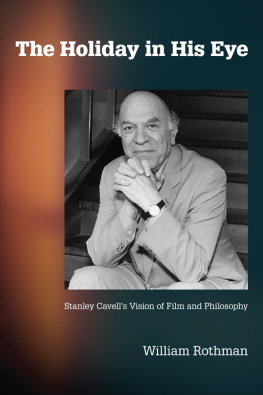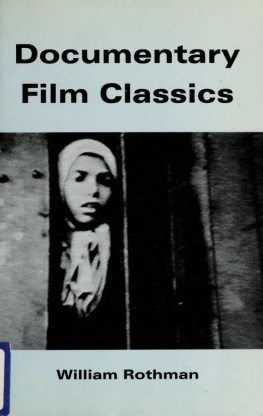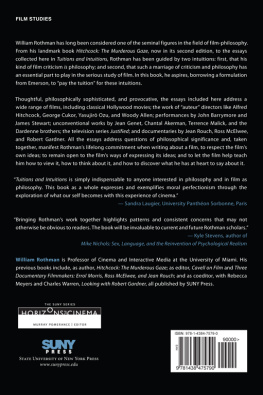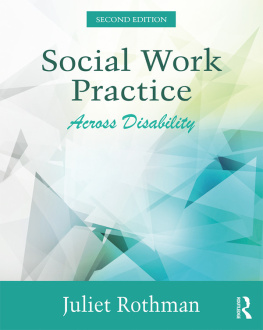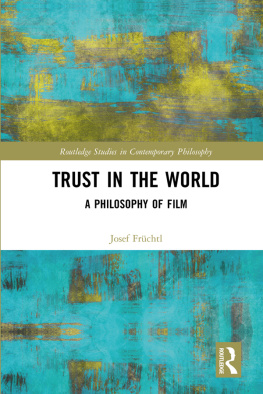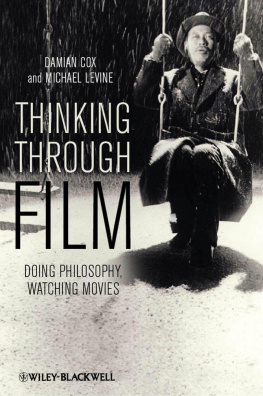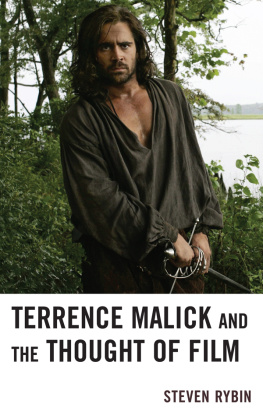The Holiday in His Eye
The Holiday in His Eye
Stanley Cavells Vision of Film and Philosophy
William Rothman
Cover: Stanley Cavell, photo courtesy of Harvard University
Published by State University of New York Press, Albany
2021 State University of New York
All rights reserved
Printed in the United States of America
No part of this book may be used or reproduced in any manner whatsoever without written permission. No part of this book may be stored in a retrieval system or transmitted in any form or by any means including electronic, electrostatic, magnetic tape, mechanical, photocopying, recording, or otherwise without the prior permission in writing of the publisher.
For information, contact State University of New York Press, Albany, NY
www.sunypress.edu
Library of Congress Cataloging-in-Publication Data
Names: Rothman, William, author.
Title: The holiday in his eye : Stanley Cavells vision of film and philosophy / William Rothman.
Description: Albany : State University of New York Press, [2021] | Series: SUNY series, horizons of cinema | Includes bibliographical references and index.
Identifiers: LCCN 2021024192 | ISBN 9781438486055 (hardcover : alk. paper) | ISBN 9781438486079 (ebook)
Subjects: LCSH: Cavell, Stanley, 19262018. | Philosophy, American20th century. | Motion picturesPhilosophy. | Motion picturesAesthetics.
Classification: LCC B945.C274 R68 2021 | DDC 191dc23
LC record available at https://lccn.loc.gov/2021024192
10 9 8 7 6 5 4 3 2 1
A man is but a little thing in the midst of the objects of nature, yet, by the moral quality radiating from his countenance, he may abolish all considerations of magnitude, and in his manners equal the majesty of the world. I have seen an individual, whose manners, though wholly within the conventions of elegant society, were never learned there, but were original and commanding, and held out protection and prosperity; one who did not need the aid of a court-suit, but carried the holiday in his eye; who exhilarated the fancy by flinging wide the doors of new modes of existence; who shook off the captivity of etiquette, with happy, spirited bearing, good-natured and free as Robin Hood; yet with the port of an emperor,if need be, calm, serious, and fit to stand the gaze of millions.
Ralph Waldo Emerson, Manners
in memory of Stanley Cavell
Contents
Preface
W hen Stanley Cavell came to Harvard in 1963, the charismatic young professor allowed me, a skinny undergraduate philosophy major with a penchant for mathematical logic, a love of movies, and a full head of hair, to enroll in a graduate aesthetics seminar devoted to film. In The World Viewed, Cavell calls that seminar a failure. As I never tire of saying, it didnt fail me.
For Cavell, the seminar was of value insofar as he took its failure as a challenge to think more deeply about what a serious study of film might require, how it might fruitfully proceed. And this led to his second course on film at Harvard, one he cotaught with Robert Gardner, the anthropological filmmaker and film artist. In Anecdote of a Season, a tribute to Gardner published in 2007 in The Cinema of Robert Gardner, Cavell wrote that super-8 cameras were made available to students, a reading list was provided, and discussions were held to relate the experience of filming, and its results, to philosophical reflection on film (Barbash and Taylor 1997, 1921). In his essay on the CavellGardner relationship for our 2016 book Looking with Robert Gardner, Charles Warren writes, Cavell says about the co-taught course that its ambition was to found a study of film where art and the way of thinking of artists and, on the other hand, intellectual reflection more familiar to universities, actually speak to each other and listen to each other, as they did at music conservatories like Juilliard, where Cavell had studied before that Road to Damascus moment when he came to the realization that philosophy, not music, was his calling (Meyers, Rothman, and Warren 2016, 65).
In the fall of 1971, Alfred Guzzetti, who was teaching filmmaking at Carpenter Center, persuaded several Harvard departments to pitch in to purchase a print of Jean-Luc Godards Two or Three Things I Know About Her. Guzzetti writes, Interest spread to a number of faculty members concerned either centrally or peripherally with film; in a short time, a study group had formed (Guzzetti 1981, 8). It included Cavell and his close friend Michael Fried, and met every week for the academic year 19711972.
In 1972, Cavell played a crucial role in securing a Luce Foundation grant for a visiting professorship in film history. The position was awarded to Vlada Petric, who was the first recipient of a doctorate from the New York University Cinema Studies Department.
The following year, Cavell helped arrange for Harvards participation, along with New York University and the State University of New York at Buffalo, in a three-year series of seminars on the problems of film scholarship and reaching. The first two years, I was an assistant professor in cinema studies and participated as a member of the NYU contingent, but these meetings made me homesick for Harvardespecially when Cavell described to me the course on film comedy he was planning to give. In teaching the course, which he offered in 1974, as he put it in the introduction to Pursuits of Happiness, thoughts of remarriage as generating a genre of film began presenting themselves to him (Cavell 1981b, 275). The third year, I was a member of the Harvard contingent, where I felt I belonged.
In the early 1970s, Cavell also worked diligently to help establish the Harvard Film Archive, with Petric its first curator, and to persuade the powers that be at Harvard to elevate Guzzettis position to a tenured professorship. And he applied for, and received, an ambitious National Endowment for the Humanities grant, Toward the Humanistic Study of Film, that made it possible for Harvard, in the words of his grant proposal, to add a set of eight courses to the present curriculum in film and to develop new teaching and research tools to help secure the humanistic incorporation of film into universities.
With interludes as a visiting lecturer in philosophy at Berkeley andenjoying the last gasp of the countercultural 1960sa year of traveling in Europe and Africa, I lived in Cambridge, Massachusetts, between 1961, when I entered Harvard College, and 1973, when I completed my doctoral dissertation in philosophyCavell was my committee chair; Hilary Putnam and Robert Nozick the other membersand accepted a position as Assistant Professor in Cinema Studies at New York University.
In 1976 my sentence at NYU was commuted when, under the terms of the NEH grant, Cavell invited me to return to Harvard to help develop the kind of film curriculum he envisioned, one with no walls separating filmmaking from film studies, or film studies from philosophy or other branches of the humanities.
Cavell also persuaded Harvard University Press to establish the Harvard Film Studies series, with myself as the initial series editor. Among the first books in the series were Guzzettis shot-by-shot reading of Godards Two or Three Things I Know About Her, based on his contributions to that 19711972 seminar; Cavells

